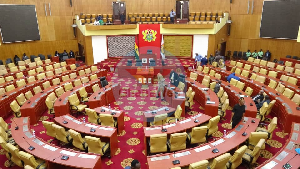Government is set to slash a huge chunk off Ministries, Departments and Agencies’ (MDAs) non-wage budgets to meet additional spending on salaries and debt servicing, as it tries all efforts to keep within its 2013 fiscal deficit target.
A proposal from the Finance Ministry to Cabinet on the expenditure realignment seeks to axe MDAs’ goods and services budget by 60 percent, in addition to a 60 percent reduction in their assets budget.
The combined savings of GH¢1.8billion will be used to offset extra spending of GH¢1.33billion on wages and GH¢357million on domestic debt servicing. Government will also use revenues of around GH¢400million expected from new taxes that were passed by Parliament last week to meet other expenditure overruns, according to the proposal.
Deputy Minister of Finance Cassiel Ato Forson told the B&FT during a meeting of the Economic Management Team at the Peduase Lodge, outside Accra, that Government plans to stick to its budget deficit target of 9 percent of GDP, despite pressure from wage spending and earlier challenges with meeting revenue targets.
Reversing the large fiscal slippage in 2012, when the deficit rose to 12 percent of GDP, is necessary to lower interest rates and curb the pricing-out of private investment projects due to expensive borrowing, said the International Monetary Fund (IMF) in a June country report.
The Fund asked Government to gain control of the public sector wage bill, the main cause of the fiscal slippage in 2012; but wages continue to threaten the budget’s execution, with the initial estimate for 2013 of GH¢9billion expected to be exceeded by 14.8 percent.
Briefing journalists at the Peduase Lodge, Finance Minister Seth Terkper said Government has already enacted a 5 percent fiscal stabilisation levy and additional import levies, and placed a “moratorium” on new capital projects to bring revenues and expenditure in line with the deficit target.
He said Cabinet has been briefed on proposals for hikes in utility prices, which have been fixed since November 2011 at the cost of expensive Government subsidies which the IMF has said fail to benefit the poorest consumers.
Government’s indebtedness to the power utilities, arising from subsidies, stood at GH¢420.99million at the end of 2012, Finance Ministry data show. The full size of the debt may not be cleared until 2014, according to a plan seen by the B&FT.
Mr. Terkper also spoke about the upcoming Eurobond, whose proceeds of US$1billion will be used to partly amortise the earlier 2007 Eurobond, refinance some domestic debts, and fund capital projects in the 2013 budget.
Business News of Tuesday, 9 July 2013
Source: B&FT
Axe falls on MDAs’ budget ...as gov’t streamlines spending
Entertainment















